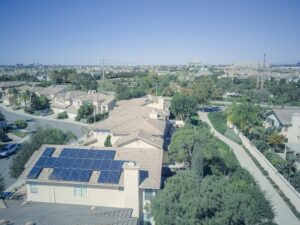
Solar panels are a popular investment for homeowners who are looking to reduce their carbon footprint and save money on their energy bills. While there are many benefits to installing solar panels on your home, it’s important to weigh the costs and benefits to determine if they are worth it for you.
One of the main factors to consider when deciding if solar panels are worth it for your home is your location. The amount of sunshine your home receives will have a direct impact on how much energy your solar panels can generate. If you live in an area with abundant sunshine, such as the southwestern United States, you will likely see a greater return on your investment than if you live in an area with frequent cloud cover. You can use online tools to estimate how much sun exposure your home receives and how much energy your solar panels would be able to generate.
Another factor to consider is your energy usage. If you use a lot of electricity, solar panels can be a great investment. They can help offset your electricity costs and provide long-term savings on your energy bills. However, if you don’t use much electricity, the savings may not be as significant. In addition, if you are planning on selling your home in the near future, potential buyers may not see the same benefits if they don’t have the same energy usage.
Cost
The cost of solar panel installation is another important consideration. While the cost of solar panels has decreased over the years, they can still be a significant investment. The cost will depend on the size of your home, your energy needs, and the quality of the solar panels you choose. It’s important to budget carefully and consider the long-term savings when making the decision to install solar panels.
One way to offset the cost of solar panels is to take advantage of government incentives and utility rebates. Many states and localities offer rebates, tax credits, and other incentives to homeowners who install solar panels. These incentives can help offset the upfront cost and make solar panels a more affordable option. However, it’s important to research what incentives are available in your area and factor them into your cost-benefit analysis.
Environmental Benefits
In addition to the financial benefits of installing solar panels, there are also environmental benefits. Solar panels generate clean energy and reduce your reliance on fossil fuels. By installing solar panels, you can significantly reduce your carbon footprint and contribute to a cleaner environment. This can be an important consideration for homeowners who are looking to reduce their impact on the environment.
Finally, it’s important to consider the long-term benefits of installing solar panels. While they may be a significant investment upfront, solar panels can provide long-term energy savings and increase the value of your home. By generating your own energy, you can reduce your reliance on the grid and insulate yourself from rising energy costs. In addition, homes with solar panels installed tend to sell for more than homes without them, which can be an important consideration for homeowners who are looking to increase the value of their property.
Conclusion
In conclusion, whether or not it’s worth it to install solar panels on your home will depend on a variety of factors, including your location, energy usage, budget, and incentives available in your area. If you live in an area with abundant sunshine, use a lot of electricity, and have the budget for it, solar panels can be a great investment. They can provide long-term energy savings, reduce your carbon footprint, and increase the value of your home. However, it’s important to carefully consider all factors and do your research before making the decision to install solar panels.